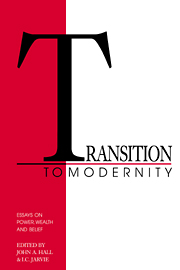Book contents
- Frontmatter
- Contents
- List of illustrations
- List of contributors
- Introduction
- PART I THE PRE-MODERN WORLD
- PART II TRANSITIONS TO THE MODERN WORLD
- PART III MODERNITY AND ITS DISCONTENTS
- 8 Science, politics, enchantment
- 9 Deconstructing post-modernism: Gellner and Crocodile Dundee
- 10 A methodology without presuppositions?
- 11 Gellner's positivism
- 12 Left versus Right in French political ideology
- 13 Property, justice and common good after socialism
- 14 Social contract, democracy and freedom
- 15 Thoughts on liberalisation
- 16 Peace, peace at last?
- Indexes
10 - A methodology without presuppositions?
Published online by Cambridge University Press: 02 February 2010
- Frontmatter
- Contents
- List of illustrations
- List of contributors
- Introduction
- PART I THE PRE-MODERN WORLD
- PART II TRANSITIONS TO THE MODERN WORLD
- PART III MODERNITY AND ITS DISCONTENTS
- 8 Science, politics, enchantment
- 9 Deconstructing post-modernism: Gellner and Crocodile Dundee
- 10 A methodology without presuppositions?
- 11 Gellner's positivism
- 12 Left versus Right in French political ideology
- 13 Property, justice and common good after socialism
- 14 Social contract, democracy and freedom
- 15 Thoughts on liberalisation
- 16 Peace, peace at last?
- Indexes
Summary
Re-reading some of Ernest Gellner's pieces of thirty or more years ago has been giving me a double enjoyment; it has been a little like seeing a Buster Keaton film one hadn't seen for years: as well as enjoying it afresh, one also enjoys the re-awakening and filling in of one's memories of it. This nostalgia-factor was particularly strong with ‘On being wrong’, a piece which I heard Gellner give as a radio talk on the Third Programme in about 1954. I had retained an audible memory of him suggesting that some kind of theological doctrine was invented to deprive the Devil of an unfair advantage, but I had forgotten what the doctrine was, though I remembered very well what the Devil's unfair advantage was. The theme of the piece was an asymmetry that crops up in various contexts, conferring an advantage on the bad opposite of something good, given mankind's preference for certainty and finality over precarious uncertainty. Consider life and death. Life, with its ever-present possibility that today will be your last, is essentially precarious, whereas with death one attains a stable and perfectly unprecarious state. ‘Death’, I remembered Gellner saying, paying Ryle a back-handed compliment, ‘is an achievement word’ (p. 47). And he cited a story by Gorki about a peasant whose longing for finality incited him to multiple murder. (I don't know whether the man could have been dissuaded from his murderous course by being told that according to some well-known metaphysical views there need be nothing final about death.
- Type
- Chapter
- Information
- Transition to ModernityEssays on Power, Wealth and Belief, pp. 231 - 242Publisher: Cambridge University PressPrint publication year: 1992



